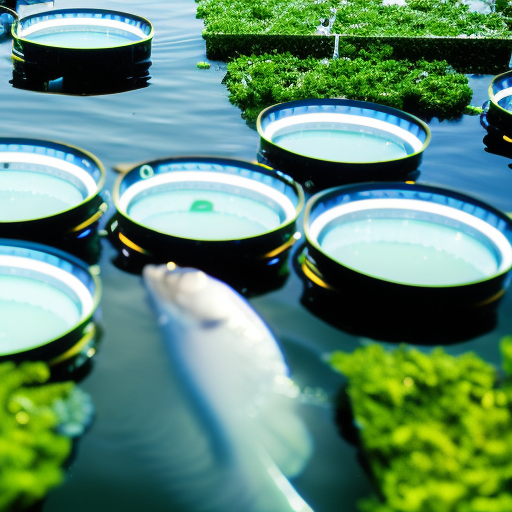Aquaculture: Overview and Importance
Aquaculture, also known as fish farming, is the practice of cultivating aquatic organisms such as fish, shellfish, and aquatic plants in controlled environments. It is an important industry that plays a crucial role in meeting the growing global demand for seafood. Aquaculture provides a sustainable solution to supplement wild-caught fish and shellfish, which are facing increasing pressure due to overfishing and habitat destruction.
Types of Aquaculture Systems
There are various types of aquaculture systems, each designed to suit different species and environmental conditions. Some common systems include:
- Marine Aquaculture: This involves farming marine species such as salmon, tuna, and shrimp in coastal areas or in open ocean cages.
- Freshwater Aquaculture: This includes farming freshwater species such as tilapia, catfish, and trout in ponds, tanks, or raceways.
- Brackish Water Aquaculture: This involves farming species that can tolerate a mix of freshwater and seawater, such as certain types of shrimp and mollusks.
- Integrated Multi-Trophic Aquaculture (IMTA): IMTA is a sustainable approach that involves cultivating multiple species in close proximity, creating a symbiotic relationship where one species utilizes the waste products of another.
Benefits of Aquaculture
Aquaculture offers several benefits, including:
- Increased Seafood Production: Aquaculture helps meet the growing demand for seafood, which is projected to increase due to population growth and changing dietary preferences.
- Reduced Pressure on Wild Fish Stocks: By providing an alternative source of seafood, aquaculture helps alleviate the pressure on wild fish stocks, which are already overexploited in many regions.
- Job Creation and Economic Development: The aquaculture industry creates employment opportunities, particularly in rural and coastal areas, contributing to local economies.
- Food Security: Aquaculture plays a vital role in ensuring food security by providing a consistent and reliable source of protein-rich food.
- Environmental Benefits: Well-managed aquaculture systems can have lower environmental impacts compared to traditional fishing methods. They can minimize habitat destruction, reduce bycatch, and limit the use of antibiotics and chemicals.
Challenges and Concerns
While aquaculture offers numerous benefits, it also faces several challenges and concerns that need to be addressed:
- Disease and Parasite Management: High stocking densities and close proximity of fish in aquaculture systems can increase the risk of disease outbreaks and parasite infestations. Effective management strategies and biosecurity measures are essential to minimize these risks.
- Environmental Impacts: Poorly managed aquaculture operations can lead to pollution, habitat degradation, and the release of non-native species. Sustainable practices, such as proper waste management and site selection, are crucial to mitigate these impacts.
- Feed and Resource Efficiency: The reliance on fishmeal and fish oil in aquaculture feeds raises concerns about the sustainability of feed sources. Developing alternative feed ingredients and improving feed conversion ratios are important for reducing the industry’s reliance on wild-caught fish.
- Social and Labor Issues: Ensuring fair labor practices, preventing human rights abuses, and addressing social impacts are important considerations in the aquaculture industry.
The Future of Aquaculture
As the global demand for seafood continues to rise, the aquaculture industry is expected to expand. Advances in technology, such as automated feeding systems, water quality monitoring, and genetic improvement, are helping to improve efficiency and sustainability in aquaculture operations. Additionally, research is underway to develop new species for aquaculture, including seaweed and other marine plants, which have the potential to provide additional economic and environmental benefits.
In conclusion, aquaculture is a vital industry that contributes to global food security, reduces pressure on wild fish stocks, and provides economic opportunities. While challenges and concerns exist, ongoing research and innovation are driving the industry towards more sustainable and responsible practices. With careful management and continued advancements, aquaculture has the potential to play a significant role in meeting the world’s growing demand for seafood.












